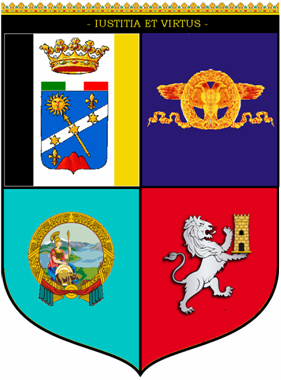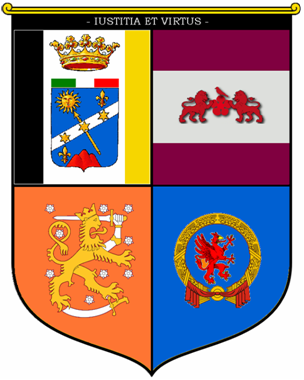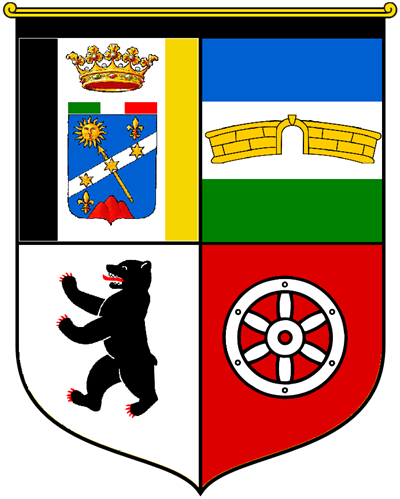Nasuti's Politics and Government
Contents
Nasuti's Politics and Government
Nasuti is a Constitutional Princedom with separation of powers: legislative to the Senato dei Fedeli (Senate of the Faithful); executive to the hereditary Prince with title of Sua Maestà Cattolica Principe (His Catholic Majesty Prince); justice to the Congregazione per la Legge dei Laici (Congregation for the Law of the Laymen).
Head of State is Sua Maestà Cattolica Principe Cris I (His Catholic Majesty Prince Cris I) and his vice is Bishop or Cardinal of the diocese named by the Pope.
Executive Branch
Head of Government is also the Prince, but he personally choise only a little part of the executive (Interior and Defense, Foreign Relationship, Treasury), while remaining is elected for 5 years with free universal votes between all of the Citizens with more of 20 years. The Prince and the member of executive not have the power to dismiss or give orders to Senators or to Judges, but the Prince choise the Chief of Justice of the Congregation for the Law of the Laymen.
The Prince have the supreme power over the member of Government choise by itself, but He can't dismiss the elected ministers; He authorizes or rejects the measures of the government and He is last responsible for the government facing God, people and history. The Prince can't introduce bills, but he has the power to veto acts of the ministers or of the legislature.
Every minister is responsible for his matter and He is occupied only of the politics that compete them. They can introduce measure only on their matter; they can only propose bills to Senate. The measure that involve all of the government require the favorable vow of the majority of the ministers and the approval of the Prince. Can become minister all of the pratice catholic citizens than have more of 30 years and that lend public profession of faith. When an elected minister resign, there is the election of a substitute.
Members of the current Government:
- His Catholic Majesty Prince Cris I of the Sovraign Family Nasuti;
- Minister of the Interior and of the Defence: Distinguished Prince Nicola II, chosen by the Prince;
- Advisors of the Prince for the Foreign Relationship: Duke Aldo and Dukess Patricia of Gaeta, chosen by the Prince; the Prince treats personally the diplomatic relationship with the foreign countries;
- Minister of the Treasury: Sara Battisti Countess of Castle Frentan, chosen by the Prince;
- Chief of the Integrated Catholic Educational System: Bishop or Cardinal of the capital diocese;
- Minister for the Free Information: Azzurra Renati Countess of Feltrin, elected;
- Minister for the Science, Technology, Reserch and Development: Engineer Faby Iana Countess of Riegne, elected;
- Minister of Transportation: Professor Riccardo Ricciuti, elected;
- Minister of Communications: Engineer Maria Elena Annecchini, elected;
- Minister of Works and Solidarity: Carmine Della Franca, elected;
- Minister of Health and Social Affairs: MD Professor Silvio Da Loreto;
- Minister of Primary Sector and Environment (agriculture, food, fishing, rural affairs, natural heritage): Luigi di Campli, elected;
- Minister of Culture: Federico Ferraro Marquis of Carmelo, elected;
Legislative Branch
The Senate of the Faithful is composed from 100 elected Senators and maximum 10 Senators to life named from the Prince. Can become Senators all of the pratice catholic citizens than have more of 30 years and that lend public profession of faith.
The Senate proposes, discusses and approves the ordinary bills. The constitution can be changed only with the authorization of the Prince.
The Senate comes elected every 5 years with universal vote between all of the Citizens with more of 20 years.
In 1st sitting the Senators elect Cancelliere del Senato (Chancellor of Senate) from the Senators to life. The Chancellor presides over, moderate and rule the activity of the Senate. He develops its assignment impartially and lose the right of vow in hall and of to propose laws.
Every proposal of the Senate must be voted by all Senators and it's approved if get the majority vote (50%+1 of Senators).
The Senate haven't the power to dismiss or give orders to Prince or to ministers or to Judges and can't rule the decison and the composition of the Nasuti's Establishment or the Costitutional form without the authorization of the Prince.
Justice Branch
The Congregation for the Law of the Laymen is the civil responsable for the justice. Is lead by Capo della Giustizia (Chief of Justice) chosen by the Prince; currently Chief of Justice is the Distinguished Prince Raffaele I.
Can ask to become Judges of the Congregation only the citizens graduated in law and that attend and pass the Corso Superiore di Formazione Legale (Superior Legal Formation Course) organizated by the Congregation: between all the candidates, only the better 25 of the year can obtain the appointment to Candidate Judge. After 5 years of pratice in the varied seats of the Congregation, if a Judge Junior pass the Esame dei Maestri della Giustizia (Examination of the Master of Justice), becomes regular Judge of the Congregation.
Every Judge is indipendent in his activity but answer to the Chief of justice for his sentence and behavior.















